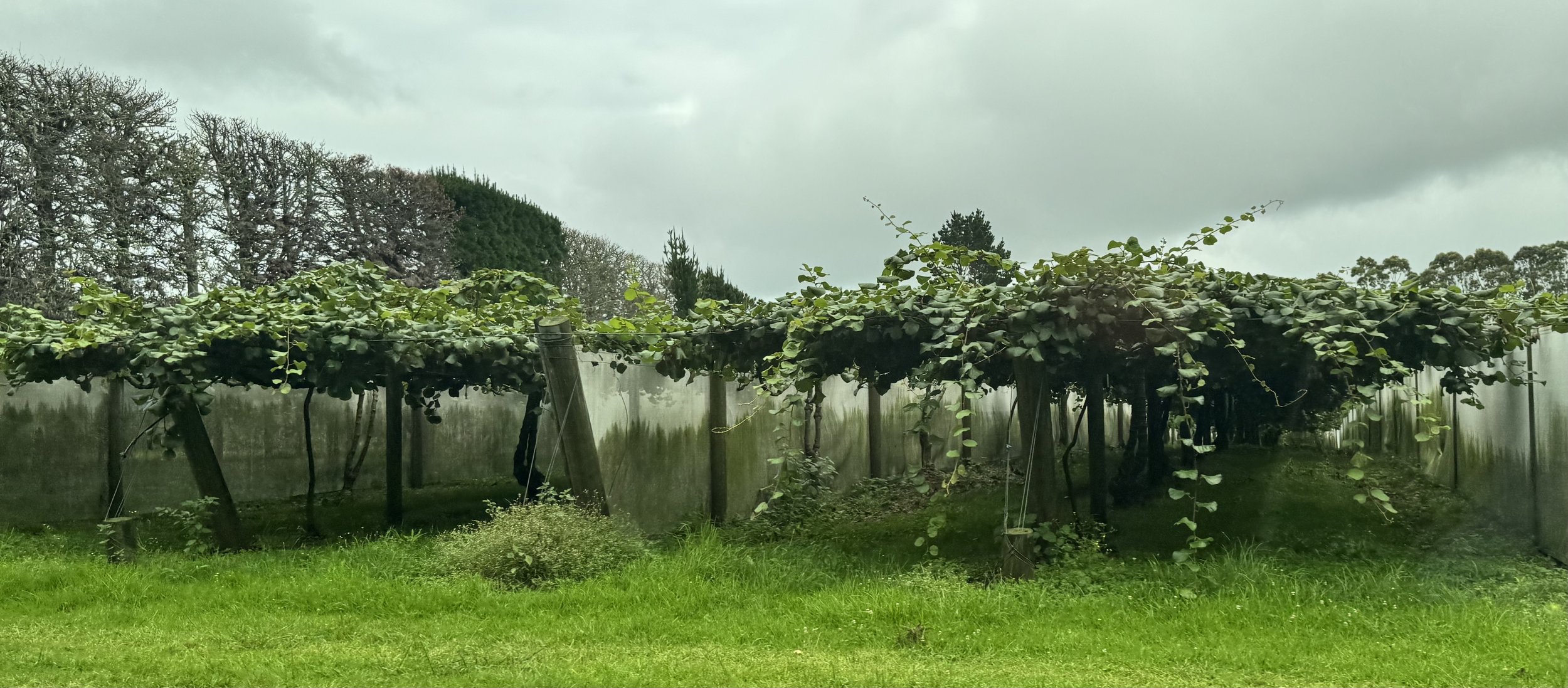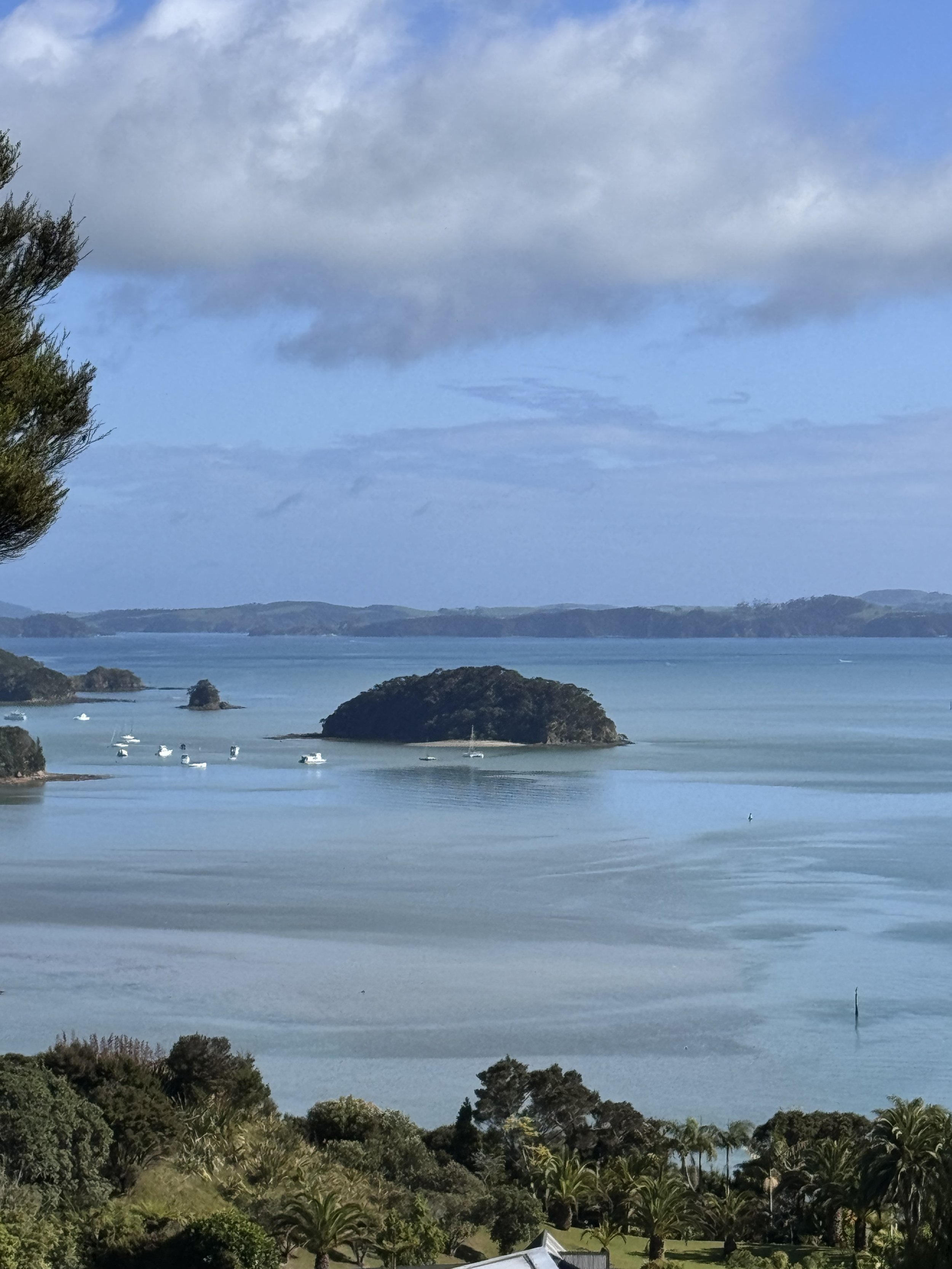Monday
It became clear very quickly we were visitors in another culture. It wasn’t the Maori signage or repeated “kia ora” from everyone we met. It wasn’t the posters of emerald green hills and sparkling waterfalls beckoning adventurers to come play. It was the fact that there was no security to clear as we made our way onto the puddle-jumper that carried us from Aukland to Kerikeri in the Northland.
The Kerikeri airport brought back memories of the old Santa Barbara one, when passengers pulled their own bags off the trailer, and taxi drivers were few and all pre-booked. Luckily David ran into Sandi, the ebullient woman who had ferried him from the marina back in October. We squashed into the back seat with a pleasant gentleman from India while the passenger seat was filled by a a returning local.
Sandi treated us to an unexpected and delightful tour of the Kerikeri region, first dropping the local gent at his mother’s house. Four generations of his family had lived on that kiwi farm, but it was time for a change: his widowed mother was downsizing. We pulled into a driveway filled with furniture waiting to be loaded into a moving van and a story that could be told the world over.
Golden Kiwis
The Indian gentleman got out at his hotel next, needing just a little help from me and Sandi to detangle his scarf from the seatbelt. I hope he is able to locate the herbal remedy he sought to alleviate foot cramps.
We worked our way through the town of Kerikeri with its boutiques and overflowing hanging flower-baskets and out to the main road that wound through farms and hills. Paihia was our first coastal view, home to the Waitangi Treaty Grounds where the Crown and Maori chiefs signed their Declaration of Independence in 1835 and later the Treaty of Waitangi on February 6th, 1840.
Security guards and barriers were in place to guide the crowds gathering for Waitangi Day. 80,000 people are expected to converge for the week-long national festival, with speeches and entertainment and food stalls and a flotilla of “waka” canoes. Politics, history, and families blend for an annual celebration of Maori culture.
Boats gather for the Waitangi Day celebrations
At last we made it to Leona. I have to confess I got a wee bit choked up at the sight, the smell, the feel of my beautiful lioness of the sea. But I didn’t have time to wallow in sentimentality. I needed to get down to business: finding the bits and bobs I had left behind and checking out the provisions.
Clearly, we wouldn’t last long with out a trip to the local Woolworth’s grocery store. So once again we shared a cab, this time with a Canadian sailor looking to repair a dingy tire. Immediately the chatter started: where did you sail from? when? weather? what’s your boat? and then the suggested places to visit, hikes to take, with cabbie and new friend overlapping each other in their eagerness to share knowledge.
Provisioning for a two week cruise feels a little different that our Pacific crossing. For one thing, I have no spreadsheets or menu plans. For another, we will never be out of sight of land. So we entered the store with a rough list, managed to fill two carts, and still forget paper towel and bread.
We ate dinner at the only place open on a Monday night: the Opou Cruising Club. With an unmatched view over the Bay toward Russell Island, the place sported a “minimalist” aesthetic of linoleum-topped tables, a fiercely grumpy manager, and tasty ales. Sated on simply grilled salmon, fresh salad and the best sweet potato fries I’ve ever had, we headed back to Leona for a deliciously early night.
I cannot help it, there is an ease bordering on complacency this time around.
Well, we won’t starve.


